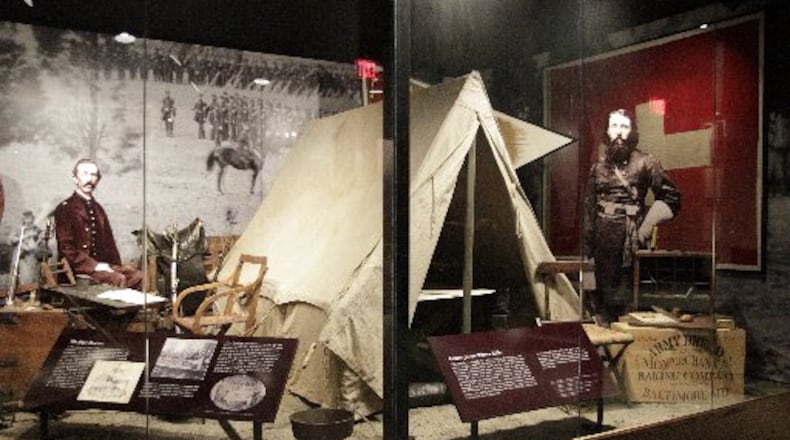Among Etcheson’s observations: “The one Republican candidate who was thought to have the chance” of winning these three crucial swing states in the 1860 presidential election was Abraham Lincoln, the son of a man who also had migrated north into Illinois.
RELATED: Stafford: Anthropologist remembers Springfield colleague
Although Etcheson focused on Putnam County, Ind., in her award-winning book on the home front, “A Generation at War: The Civil War Era in a Northern Community,” she said both Illinois and Ohio were “part of the same phenomenon” of migration and transformation in the 1850s.
Just as all three states have counties named for Revolutionary War Gen. Israel Putnam and Col. George Rogers Clark, all adopted “Black Laws” in the 1850s that not only made it illegal for blacks to vote, serve on juries or testify against white people, but imposed general restrictions on free blacks taking up residence.
Etcheson said A.C. Stevenson, a Putnam County farmer who dabbled in politics, was a vocal support of laws punitive enough to dissuade African Americans of what he called the “ridiculous notion that they belonged” in the state.
Although Etcheson says she has “no smoking gun” to prove her suspicion, she suspects Stevenson’s attitude explains why the black Peters family, which had come to Indiana with the Stevensons, decided to migrate to Liberia in the 1850s, a time when few black families did.
DETAILS: Springfield tied to the mother of modern CSI work
She sees the Stevenson-Peters story as part and parcel a Putnam County of 1860 whose newly elected congressman, Daniel Vorhees, gave a speech in Greencastle, arguing that “not one man, not one dollar” should be spent by the federal government in a fight against “brothers in the South.”
Nevertheless, when the war began, Etcheson said, “All these men from Putnam County turn out to volunteer” for the Union Army.
She sees it as an early sign of how the war would change the political landscape in the three “Western” states of the time.
Initially “emancipation is a big deal for Midwesterners, as much because (of a fear that) freed slaves might come into Ohio or Indiana as the fact that they’re going to be free,” Etcheson said.
Although she said the 1862 by-election was more about Northern dissatisfaction with the federal war effort, Lincoln’s announcement that he would free the slaves in Southern states on Jan. 1, 1863, also contributed to heavy Republican losses.
READ MORE: Springfield group dies into archaeological secrets
In both Ohio and Indiana, Republicans went from holding a majority of Congressional seats to a minority, and in Illinois, the Democratic majority was bolstered by three representatives.
For Lincoln and his party, “It was quite a setback,” Etcheson said.
But as the war dragged on and casualties mounted, bitterness toward the South “destabilizes and undercuts the whole system of white supremacy of which the Black Laws” are a part of, Etcheson said. And politics radicalizes, she said, “Lincoln is able to make the case to Northerners that slavery is the cause of the war and that if we don’t get rid of slavery, it’s going to come back.”
He also argues that emancipation will help the war effort by freeing slaves and sapping the South’s economy and ability to fight the war, and by adding black troops to Northern ranks and strengthening the army.
It’s important to note that these are not arguments to support abolition for abolition’s sake; they instead are arguments tailored to appeal to the swing state voters of Southern Ohio, Indiana and Illinois who might not support emancipation for the sake of slaves’ freedom but might support it to save the Union and punish the South.
Remembered as “the Great Emancipator” for pursuing a war that ultimately ended slavery, Lincoln also acted as a crafty politician who knew the politics of Southern Indiana, Ohio and Illinois as perhaps only a native or the region could.
In her research on Putnam County, Etcheson stumbled across a tidbit of information after that provide a kind of footnote for post-war Putnam County.
It involves Robert Townsend, a third generation black resident, whose family had migrated north with a white Townsend family. He had joined a black unit during the war and died of disease while in camp, never seeing combat.
While trying to find the graves of a black couple in Putnam County, Etcheson visited a Putnam County library to check a graves registry and found there was only one black person in it: Townsend’s.
“In the 1870s, when white veterans set about compiling the list of Civil War veterans from the county, they made sure (he) got a (military) tombstone,” Etcheson said.
At a time when Americans as a whole were beginning to retreat from promises made to blacks during heat of war, at least his brothers in arms did not break ranks with Robert Townsend.
Other presenters at the Springfield Civil War Symposium will be:
• Mark Grimsley, associate professor of history at Ohio State University, who will discuss Reconstruction.
• Ethan Refuse, professor of Military History at the U.S. Army General Command and Staff College, who will explore Stonewall Jackson and the role of Kansas in the national conflict;
• Thomas T. Taylor, professor of history at Wittenberg University, who will report on the military contributions of Springfielder J. Warren Keifer.
For details on registering for the symposium, call (937) 324-0657.
If you go
What: The Springfield Civil War Symposium
When: 9 a.m. to 4 p.m. Saturday, April 22
Where: Clark County Heritage Center
Registration: Call 937-324-0657
About the Author
